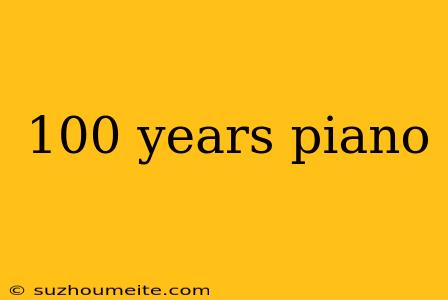100 Years of Piano: A Journey Through Time
The piano has been a beloved instrument for centuries, evoking emotions and creating unforgettable experiences for people of all ages. As we celebrate 100 years of piano, let's take a journey through time to appreciate its evolution, impact, and significance in our lives.
The Early Years (1700s-1800s)
In the early 18th century, the piano was invented by Bartolomeo Cristofori, an Italian instrument maker. Initially called "pianoforte," it was designed to be a more expressive and versatile alternative to the harpsichord. The piano's unique mechanism allowed for a wider range of dynamics, from soft and delicate to loud and powerful.
Romantic Era (1800s-1900s)
The Romantic era saw the rise of iconic composers like Chopin, Liszt, and Brahms, who pushed the boundaries of piano music. Their compositions emphasized emotion, passion, and technical virtuosity, further elevating the piano's status as a concert instrument.
Jazz and Popular Music (1900s-1950s)
The early 20th century witnessed the emergence of jazz and popular music, which revolutionized the piano's role in music. Artists like Duke Ellington, Count Basie, and George Gershwin created new styles that incorporated improvisation, syncopated rhythms, and rich harmonies.
Modern Era (1950s-2000s)
The post-war period saw the development of various piano styles, from classical to rock and pop. Pianists like Vladimir Horowitz, Glenn Gould, and Keith Jarrett redefined the instrument's possibilities, while composers like Philip Glass and Steve Reich introduced minimalism and new wave.
Contemporary Scene (2000s-Present)
Today, the piano remains a versatile instrument, with pianists like Lang Lang, Yuja Wang, and Max Richter pushing the boundaries of classical music. The rise of digital pianos and keyboards has also democratized access to music-making, enabling people of all backgrounds to explore their creativity.
The Piano's Impact on Society
The piano has played a significant role in shaping our cultural heritage. It has:
- Fostered creativity: Inspired countless composers, performers, and music enthusiasts.
- Brought people together: Provided a common language for people from diverse backgrounds.
- Preserved history: Allowed us to appreciate and understand the music of past generations.
Conclusion
As we celebrate 100 years of piano, we honor the instrument's rich history, its impact on our lives, and its continued relevance in modern times. The piano remains an integral part of our cultural fabric, inspiring future generations to create, express, and connect through music.
Sources
- "The Piano: A History" by James Parakilas
- "The Oxford Handbook of the Piano" edited by David Rowland
- "Piano: An Encyclopedia" by Robert Palmieri
